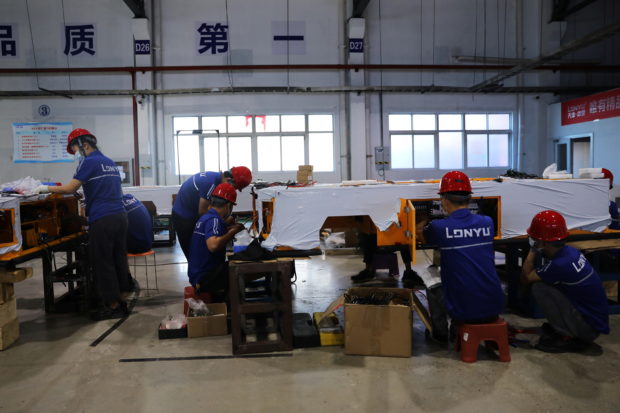
FILE PHOTO: Employees work on assembling automated guided vehicles (AGV) at a Lonyu Robot Co factory in Tianjin, China, September 7, 2021. REUTERS/Tingshu Wang
MANILA, Philippines — Developing Asia’s economic rebound this year could be dented by the rapid spread of the Delta coronavirus variant, the Asian Development Bank said on Wednesday, as it urged economies to adapt to a ‘new normal’ after COVID-19 to underpin recovery.
Growth in developing Asia, which groups 46 countries in the Asia-Pacific, is projected to reach 7.1% this year, the ADB said in an update to its Asia Development Outlook report, down from its 7.2% forecast in July and 7.3% in April.
While seeing a slight downgrade, this year’s growth estimate is a turnaround from the region’s 0.1% contraction last year. For 2022, the ADB kept its 5.4% growth forecast for developing Asia.
The growth projections are not without risks, the ADB said, given the threats posed by the emergence of new coronavirus variants, slower-than-expected vaccine rollouts, and waning vaccine effectiveness.
The region has immunized close to 30% of its population as of the end of August, the ADB said, lagging behind advanced economies like the United States and in the European Union, which have fully vaccinated more than half of their population.
“Developing Asia remains vulnerable to the COVID-19 pandemic, as new variants spark outbreaks, leading to renewed restrictions on mobility in some economies,” ADB Acting Chief Economist Joseph Zveglich said in a statement.
The ADB said the recovery path within the region remained uneven given countries’ varying degrees of progress in tackling the pandemic.
China is on track to grow 8.1% this year, with the pace of expansion projected to slow to 5.5% next year, the ADB said.
Abdul Abiad, Director of ADB’s Macroeconomic Research Division, noted in a media briefing that China’s property developer Evergrande’s debt problem, which have rattled global markets, “warrants careful monitoring.”
“Housing is an important component of the Chinese economy. If the property sector is impacted that could have knocked on effects on the broader the Chinese economy,” Abiad said.
But should it default, Abiad said the capital buffers of China’s banking system “are strong enough to absorb a shock even of Evergrande’s size”.
The ADB also maintained its growth outlook for India at 10.0% this year and 7.5% next year.
Fresh outbreaks of the Delta variant took a toll on Southeast Asian economies, with the region now projected to grow an even slower pace of 3.1% this year from ADB’s July estimate of 4.0%, with strife-torn Myanmar suffering a deeper 18.4% slump.
Policy measures should not only focus on containment and vaccination, but reorienting economic sectors to adapt to a ‘new normal’ once the pandemic subsides to kickstart the recovery, Zveglich said.

